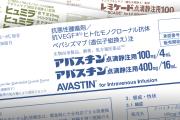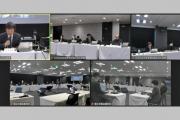A slew of major brands will be slammed by double-digit price reductions under the 2020 price revision next month due to special re-pricing rules, deferred price cuts for the price maintenance premium (PMP), and the so-called G1/G2 rule for off-patent products, a Jiho survey shows.
The survey looked into the impact of the 2020 price revision on drug makers’ top five products by Japan revenue. Of the total of 195 products owned by 41 companies that gave valid responses, 22 (17 companies) will face double-digit reductions. Of this, seven will see their reductions exceed 20%. Of their top five products, Chugai Pharmaceutical will suffer double-digit cuts for three, and Ono Pharmaceutical, Pfizer, and Seikagaku for two.
The 22 products facing double-digit reductions include MSD’s anti-PD-1 antibody Keytruda (pembrolizumab; 20.9%), Chugai’s cancer drug Avastin (bevacizumab; 15.7%), Otsuka Pharmaceutical’s selective vasopressin V2 receptor antagonist Samsca (tolvaptan; 16.5%), Daiichi Sankyo’s anticoagulant Lixiana (edoxaban; 25.0%), Kyowa Kirin’s renal anemia treatment Nesp (darbepoetin alfa; 13.1%), and Teijin Pharma’s gout and hyperuricemia drug Feburic (febuxostat; 14.6%).
Of the seven products bracing for 20%-plus reductions, three products face the slashes under special re-pricing rules - Keytruda, Lixiana, and Pfizer’s Vyndaqel (tafamidis; 25.0%), a treatment for transthyretin familial amyloid polyneuropathy (TTR-FAP). Meanwhile, the other four products will be hit by deferred PMP cuts (or a one-time payback for previously received PMP benefits after generic and biosimilar entries or 15 years of launch) - Ono’s nausea and vomiting treatment Emend (aprepitant; 24.3%), Mochida Pharmaceutical’s pain medication Tramcet (tramadol + acetaminophen; 21.3%), Torii Pharmaceutical’s oral pruritus drug Remitch (nalfurafine; 21.01%), and Nippon Boehringer Ingelheim’s COPD treatment Spiriva (tiotropium; 22.4%).
Price Maintained for Opdivo, Maviret
Meanwhile, the survey showed that prices will be kept unchanged for a total of 35 products (20 companies) under the 2020 revision, including 24 products eligible for the PMP. The 24 include Ono’s anti-PD-1 antibody Opdivo (nivolumab), AbbVie’s hepatitis C drug Maviret (glecaprevir + pibrentasvir), Takeda Pharmaceutical’s ARB Azilva (azilsartan), Shionogi’s anti-flu agent Xofluza (baloxavir marboxil), and Eisai’s cancer drug Lenvima (lenvatinib).
Price Raises for Nexium, Humira
In the meantime, Daiichi Sankyo’s proton pump inhibitor (PPI) Nexium (esomeprazole) will gain a price raise of 0.9% thanks to a post-launch premium for pediatric use. Eisai/AbbVie’s anti-TNF-α monoclonal antibody Humira (adalimumab) will earn a 1.6% raise on a premium associated with orphan indication additions.
AbbVie will enjoy a price maintenance or price raise for four of its top five products, while Alexion Pharmaceuticals will see all its four products keep their prices in the upcoming revision.
Different Reduction Rates for DOAC, PPI Rivals
Elsewhere, the survey revealed that there are differences in reduction rates between competitor products in the same therapeutic market depending on PMP eligibility and re-pricing applications.
Among three direct oral anticoagulants (DOAC) given in the survey, Lixiana will face a big 25.0% ax under what is dubbed huge-seller re-pricing, while BI’s Prazaxa (dabigatran) and Bayer Yakuhin’s Xarelto (rivaroxaban) will see a slim 0.7% and 0.6% cut, respectively.
Among PPIs, Nexium will get a 0.9% raise, while Takeda’s Takecab (vonoprazan) will see its price trimmed by 0.8%. EA Pharma’s Pariet (rabeprazole), which already faces generic competition, is receiving a deeper 4.3% reduction.











